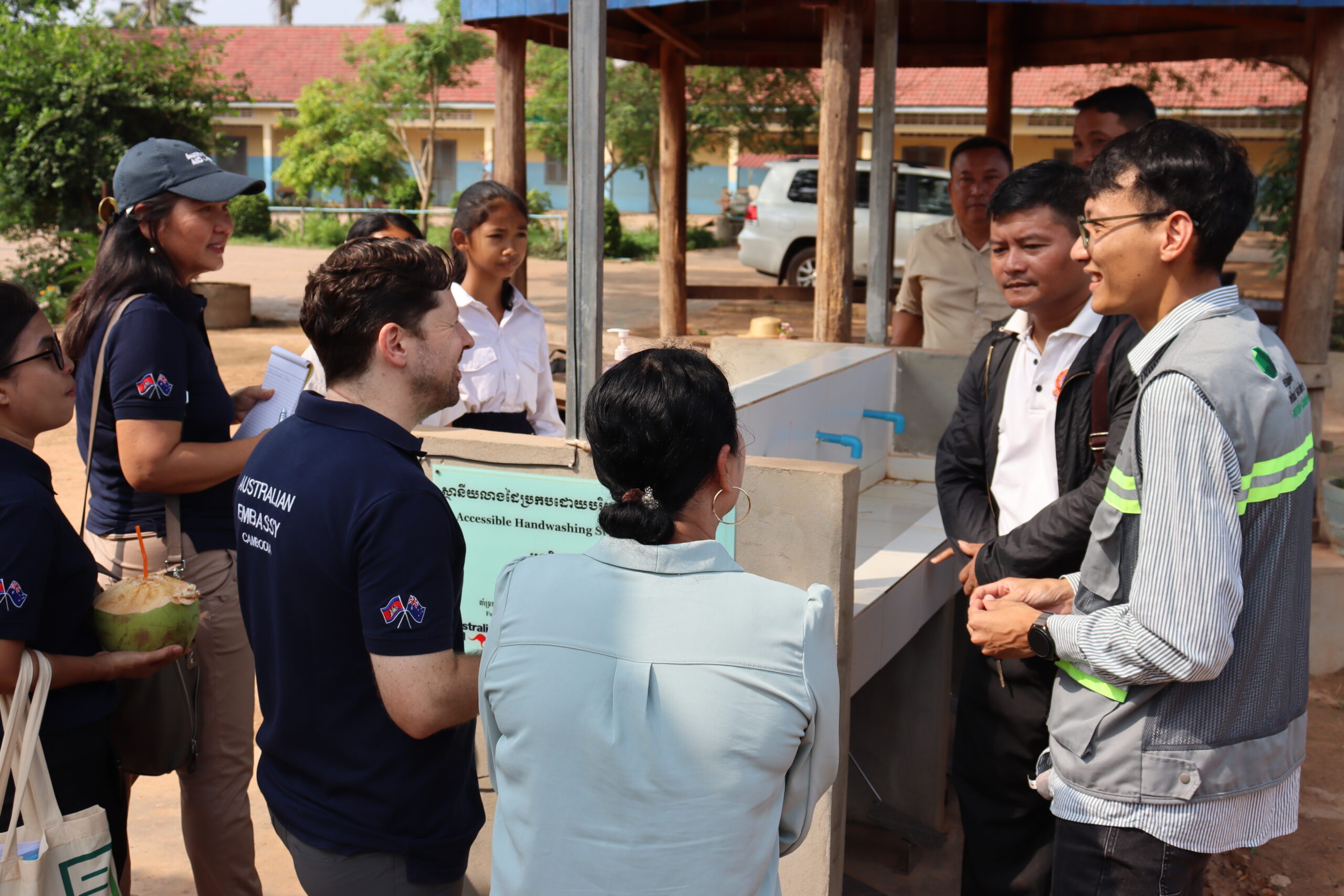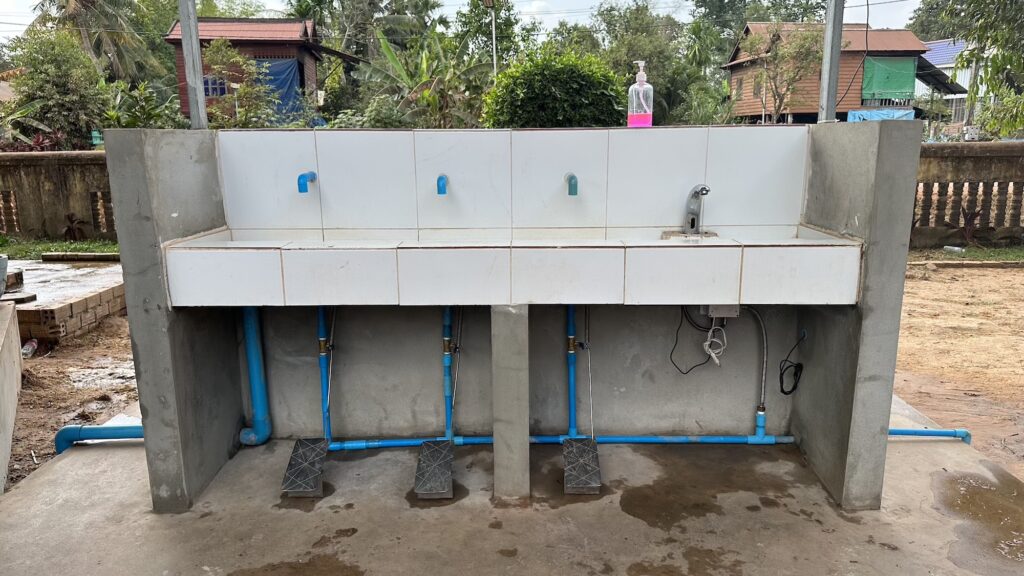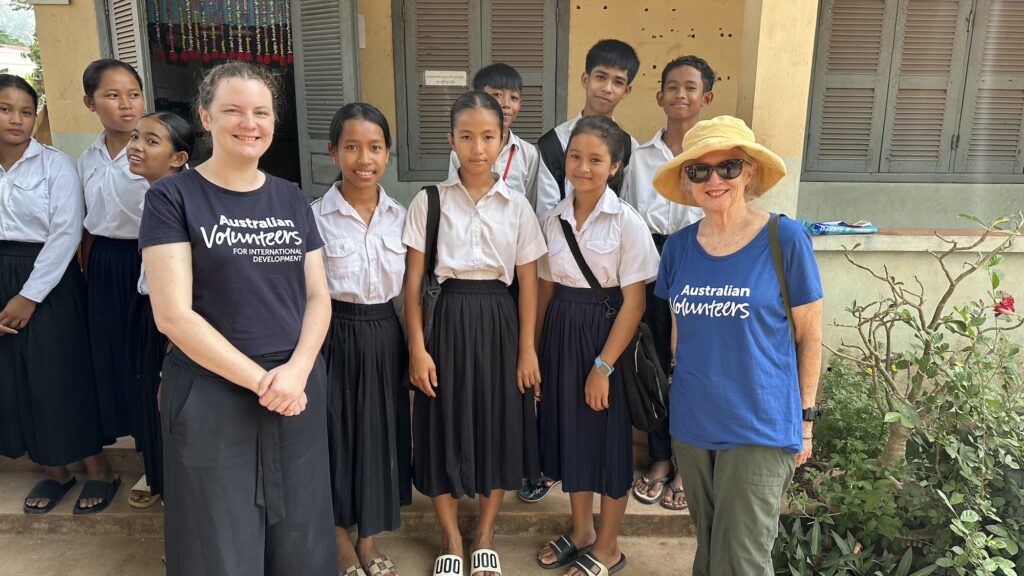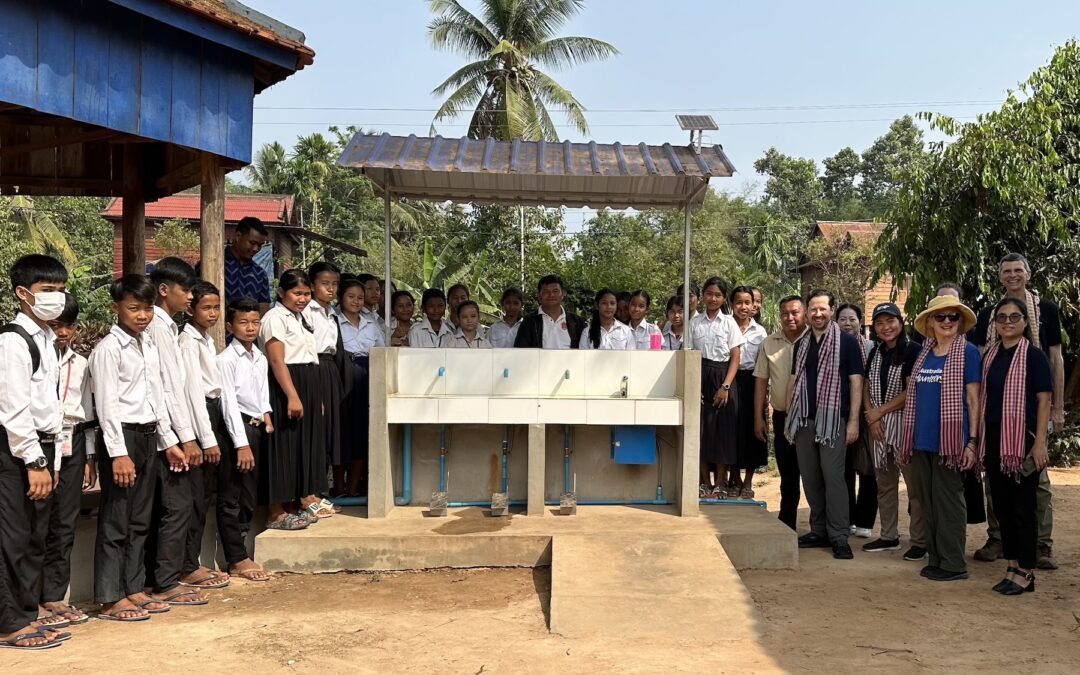Many school children in Cambodia do not have access to appropriate sanitation facilities, particularly in rural areas where a third of schools lack adequate hygiene facilities with soap and water.
The link between sanitation and education became especially apparent when the COVID-19 pandemic hit Cambodia, with school closures resulting in the disruption of learning. Improving hand hygiene was a key part of reopening schools safely and minimising disruption to education.
The EWB Australia in Cambodia team has recently partnered with local student-run organisation, Cambodia Rural Students Trust (CRST) to install handwashing stations across five rural schools in Siem Reap, aiming to improve access to sanitation and create a foundation for positive educational outcomes. Alongside their work designing and installing handwashing stations, EWB also worked closely with CRST to assess 10 schools in Siem Reap on their provision of sanitation facilities.

Andreas Zurbrugg, the Deputy Ambassador from the Australian Embassy in Cambodia, visiting the EWB Australia in Cambodia team in Siem Reap to see our handwashing stations.
WASH and Education
Approximately 22% of schools in Cambodia lack basic drinking water services and 37% of schools lack basic sanitation services. Ensuring adequate sanitation can be a challenge in rural areas in particular, due to poor infrastructure and a lack of awareness about hygiene.
Hygiene became a key priority for schools during the COVID-19 pandemic. In an interview, Tan Sopheak, principal of Sret Secondary School in Siem Reap, emphasised the need for good hygiene practices to keep students engaged and consistently attending school.
‘Washing hands prevents illnesses and the spread of infections to others. If any students are infected, they will miss school and spend time at the hospital.’
Making sanitation facilities widely available, including at schools, is an important part of reducing dropout rates. This applies particularly to female students, who often drop out of school to help take care of their families.
Tan Sopheak stressed that improving sanitation in rural areas and providing a hygienic, clean environment would impact students’ lives for many years to come.
‘If we are not healthy, everything is impossible to accomplish. Overall, health is incredibly important.’
Assessing sanitation in Siem Reap schools
The EWB team supported community partner, CRST, in conducting sanitation infrastructure assessments at 10 schools in rural Siem Reap. EWB ran a series of workshops which trained CRST in conducting field assessments, developing assessment templates and measuring infrastructure. Through the workshops, CRST were able to build the skills they needed to successfully carry out this assessment and other similar work in the future.
EWB also helped CRST expand the scope of their assessment, widening the focus from drinking water to incorporate other questions about water source, number of toilets, gender inclusivity and disability inclusion.
The results from these assessments were provided to the schools, giving suggestions for improvements they could implement and which facilities were needed to ensure good hand hygiene and access to clean drinking water.
Installing accessible handwashing stations

An accessible handwashing station installed at Sret Secondary School.
EWB Australia in Cambodia first began designing accessible handwashing stations in 2021 in response to the spread of the COVID-19 pandemic. These stations were implemented in COVID-19 treatment centres and quarantine centres throughout the year. They were specifically designed to minimise touchpoints, operated using a foot-operated pedal.
The positive response to these stations led the EWB Australia in Cambodia team to expand the initiative to schools. Handwashing stations were installed at five primary schools in Siem Reap province, providing accessible sanitation facilities to 490 students and 30 teachers.
The stations were designed using EWB’s Technology Development Approach to develop a prototype that considered disability access. The team consulted with community partners throughout the installation process, conducting site visits to schools to better understand their needs. Installation of the handwashing stations commenced in November 2022, with stations at five schools now complete.
The handwashing stations are located in outdoor spaces outside the schools. They were designed to be no-touch, operated using a foot controlled pedal, and are connected to solar panels. The design for the stations also incorporates a ramp to ensure wheelchair access.
The new handwashing stations have been positively received by the schools. Students from the pilot schools reported that they were very happy to use the handwashing stations, washing their hands more frequently each day.
Student Suengg Sak said, ‘I really like this handwashing station because it’s convenient to use and accessible for all students, especially students with disabilities.’
Improved sanitation and hygiene practices will continue to reap benefits for students like Suengg Sak, who aspires to be a teacher in the future.
Next steps

EWB Australia Field Professional volunteers with school students in Siem Reap.
The team is now looking ahead to how they can continue the initiative and continue to improve the WASH sector in Cambodia. They are continuing their work with assessing sanitation in schools, currently finalising their data analyses and recommendations. They are also seeking funding to support the installation of more handwashing stations across schools in rural Cambodia.
Tan Sopheak emphasised the importance of handwashing stations as a way of enabling and empowering students’ education. ‘A handwashing station is very important – it can [help] students stay healthy and reduce the dropout rate.’
The ultimate goal, he says, is to keep students healthy so they can finish their education. ‘Once students are educated, they will know what they want to do and how to get there.’
This project was generously supported by EWB ACT Chapter member Charlotte Fell through a donation received by the GHD Foundation.
EWB’s work in Cambodia receives support from the Australian Government Department of Foreign Affairs and Trade through the Australian NGO Cooperation Program (ANCP) and generous donors. You can support our work as well by making a donation here.


